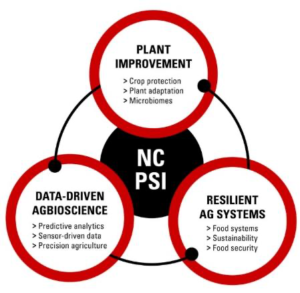 The GRIP4PSI initiative enables the NC State community to collaborate on integrated research/outreach projects that are focused on plant improvement, data-driven agricultural bioscience, and resilient agricultural systems. This program is intended to seed, incentivize and amplify visionary research that will result in a high return on investment in terms of extramural funding, award-winning research impacts, and first-class interdisciplinary graduate education and training.
The GRIP4PSI initiative enables the NC State community to collaborate on integrated research/outreach projects that are focused on plant improvement, data-driven agricultural bioscience, and resilient agricultural systems. This program is intended to seed, incentivize and amplify visionary research that will result in a high return on investment in terms of extramural funding, award-winning research impacts, and first-class interdisciplinary graduate education and training.
Four awards were made each worth up to $650,000 over three and a half years, and are supported by the Office of Research and Innovation in partnership with the College of Agriculture and Life Sciences, the College of Engineering, the College of Natural Resources, the College of Sciences, Wilson College of Textiles, Poole College of Management, the Office of the Provost, and the Kenan Institute for Engineering, Technology and Science. KIETS Associate Director Raj Narayan served on the GRIP4PSI proposal review and selection committee. The GRIP4PSI projects awarded and in progress are as follows:
- Dr. Christine Hawkes, Department of Plant and Microbial Biology, FUN-CROPS: Foliar Fungal Endophytes for Enhanced Crop Sustainability and Resilience;
- Dr. Jean Ristaino, William Neal Reynolds Distinguished Professor and Director of Emerging Plant Disease, Department of Plant and Microbial Biology, Plant-Aid: A Data- Driven and Sensor-Integrated Platform for Monitoring Emerging Plant Diseases;
- Dr. Katharina Stapelmann, Department of Nuclear Engineering, Harnessing (Bio-) Electrochemical Technologies as Sustainable Sources for On-Demand Precision Agriculture;
- Dr. Cranos Williams, Department of Electrical and Computer Engineering, Improving Crop Productivity and Value Through Heterogeneous Data Integration, Analytics, and Decision Support Platforms.
Outcomes for the GRIP4PSI second fiscal year 2021-22 of support included the following: 22 follow up funding proposals submitted; 11 follow up funding proposals awarded for a total of $12,488,238; 28 students supported; 96 publications or presentations generated; and 1 workshop.
